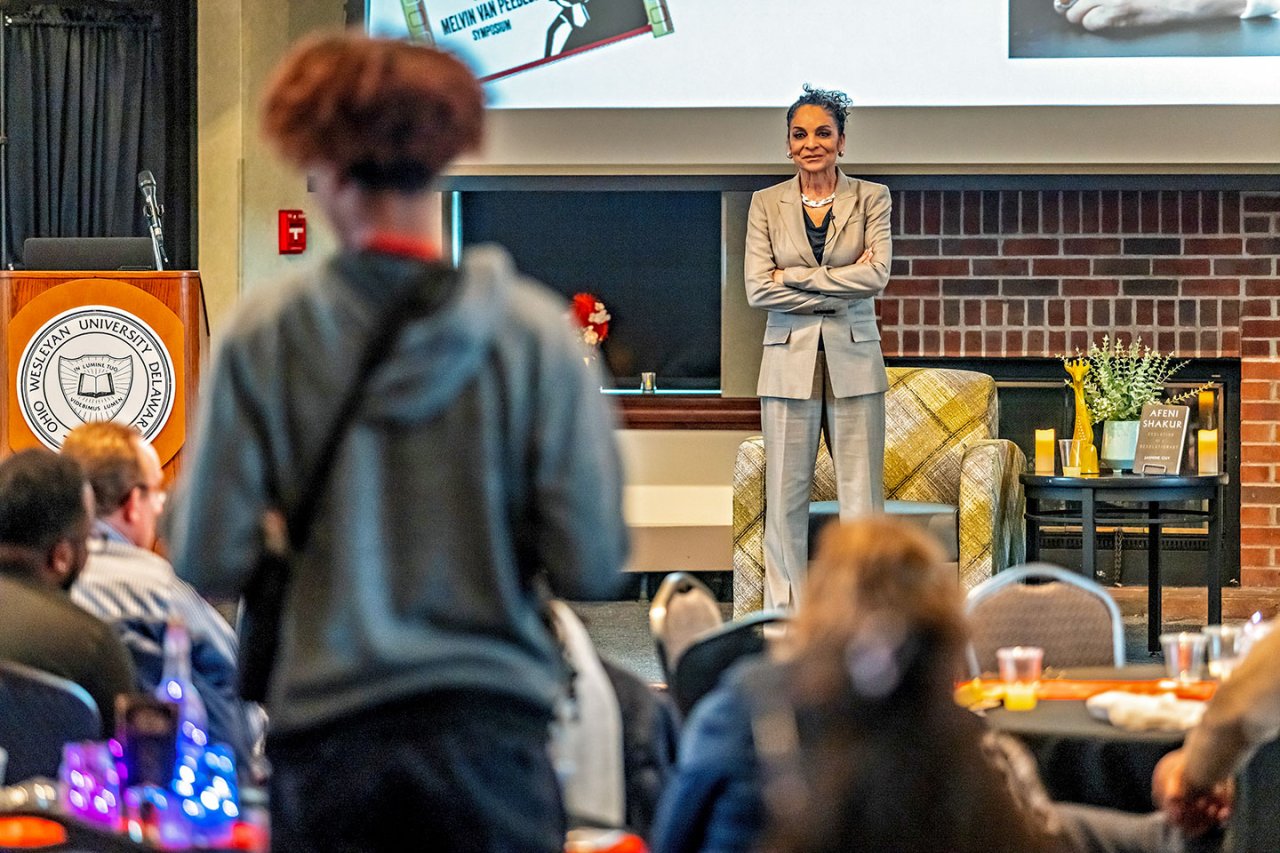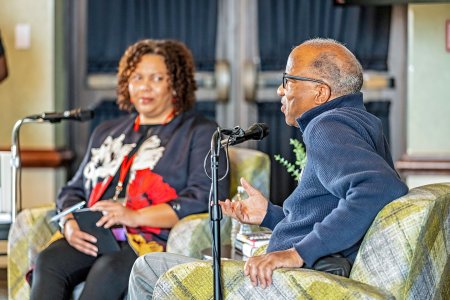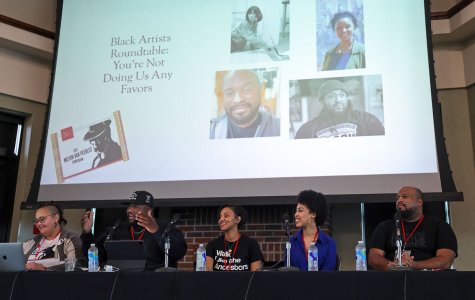‘We Got Your Back’
Ohio Wesleyan’s Melvin Van Peebles Symposium Honors Struggles, Successes of Black Artists

Ohio Wesleyan University celebrated the legacy and artistic influence of 1953 OWU alumnus Melvin Van Peebles during a three-day, sold-out symposium March 30-April 1.
Remembered as “an innovator in film, theater, music, art, literature, and business,” Van Peebles is best known for his films “Watermelon Man” and the groundbreaking “Sweet Sweetback’s Baadasssss Song.”
The Ohio Wesleyan event featured a concluding conversation with actress-dancer-director Jasmine Guy (“A Different World”) and keynote dialogues and discussions with award-winning writer Wil Haygood (“Colorization: One Hundred Years of Black Films in a White World”) and academic and author Simone Drake (an editor of “Are You Entertained?: Black Popular Culture in the Twenty-First Century.”)

Smashing Stereotypes
A recurring topic during the symposium was Van Peebles’ effort to allow Black actors and stories to simply be “ordinary,” to create works that depicted Blacks as more than single-identity stereotypes.
Before Van Peebles produced 1967’s “The Story of a Three-Day Pass,” 1970’s “Watermelon Man,” and other seminal films, “Hollywood’s Blacks exist primarily for white spectators,” said Hélène Charlery, an associate professor in American and Film Studies at the University of Toulouse Jean Jaurès.
Charlery was one of two academics traveling from France to present at the symposium. Other presenters and performers included actor Clayton LaBouef, known for roles on NBC’s “Homicide: Life on the Street” and HBO’s “The Wire”; interdisciplinary artist and instructor Vaunita Goodman; Van Peebles’ New York neighbor of six years, professional photographer Kathryn Weill, as well as central Ohio’s own DJ O Sharp and Marshall L. Shorts Jr.
Moving Mountains
Keynote speaker Haygood, also known for “The Butler,” told symposium attendees that Van Peebles had to “move a mountain” to make his films his way. Haygood said the issues Van Peebles faced are important to explore and understand as the nation today is experiencing book banning, film festivals skittish about offending white audiences, and schools debating whether to teach children about slavery in America.
“Why are we here?” Haygood asked the crowd. In the final analysis, he said, the symposium is sending an important message to the legacy of Van Peebles – the artist died in 2021 – and to the many Black artists he continues to inspire.
“We got your back,” Haygood said. “Melvin Van Peebles has shown us a roadmap. … “We hear you, and we got your back.
“You were on the job,” he continued in homage to Van Peebles. “Ohio Wesleyan is on the job. A line has been drawn in the sand, and we won’t let you down.”

Being Represented
Several Ohio Wesleyan students volunteered at, attended, and presented at the symposium, including Mary Grace Duffy, a junior from Delaware, Ohio, and first-year student Pedro Figueiredo of Salvador, Brazil. Both discussed Van Peebles-themed works they created while in independent study with OWU’s director of Film Studies and Van Peebles Symposium co-chair Eva Paris-Huesca, Ph.D.
Echoing the thoughts of other Van Peebles scholars at the event, Figueiredo said an important takeaway from his studies is that Van Peebles removed “the exotic burden” of being Black for actors and audiences. “I learned that Black people want … to be represented,” he said.
When Ohio Wesleyan students asked Haygood and Guy in separate sessions about how young people can help to get Black voices heard and how newcomers can find success in today’s artistic environment, both veterans offered sage advice.
Haygood reminded the students that, like Van Peebles, “you have to walk up to the mountain.”
“Fly on your ideas,” he said. “There are a lot of people who are waiting on you.”
And Guy shared that developing one’s craft remains key. “When your soul is calling to be fed, sometimes we don’t know how to feed it,” she said. “Support your gifts with information, knowledge, and technique.”
She also told the full house of symposium guests: “I’m hoping before I die, we come to a place where we understand how much we are alike. … I keep thinking we are going to mature into being ‘human beings’ with each other.”
Pressing Forward
The inaugural Melvin Van Peebles Symposium was planned by Ohio Wesleyan’s Department of Africana, Gender, and Identity Studies; Film Studies Program; Department of Journalism and Communication; Department of Performing Arts; Office of the Chief Diversity Officer; and Office of Multicultural Student Affairs via a committee that also included Haygood and Delaware educator Francine Butler.
The University anticipates making it a recurring event, continuing to explore the impact of Van Peebles and the evolution of Black arts.
Ohio Wesleyan senior Adrian Moran, who helped to coordinate the event, said the symposium was an informative and eye-opening experience.
“I will never forget the amazing people I have met at the symposium and all the thoughtful conversations we have had,” said Moran, a Politics and Government major and Women’s and Gender Studies minor from Santa Clarita, California. “I am beyond grateful to have met local BIPOC artists, race scholars, and presenters who all reciprocated the support, passion, and love that I saw this committee put into this symposium.”
Jada Respress, an Ohio Wesleyan senior and future reporter, also attended the symposium and had “an amazing conversation” during a one-on-one media interview with Guy.
“My biggest takeaway was from the keynote speech from Mr. Haygood,” said Respress, a Communication major and Politics and Government minor from Reynoldsburg, Ohio. “He said that Black students shouldn't let their ideas die. That's what Hollywood is looking for.”
